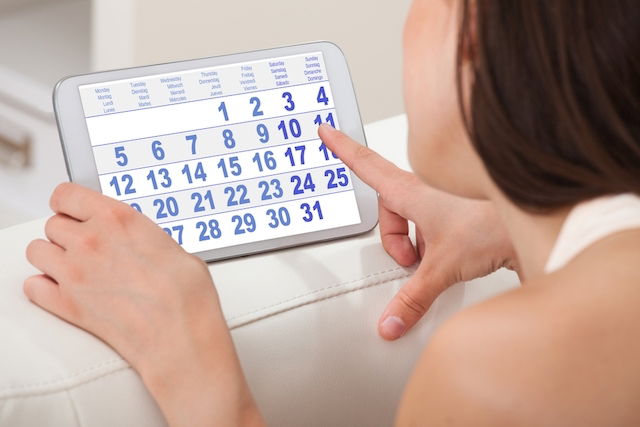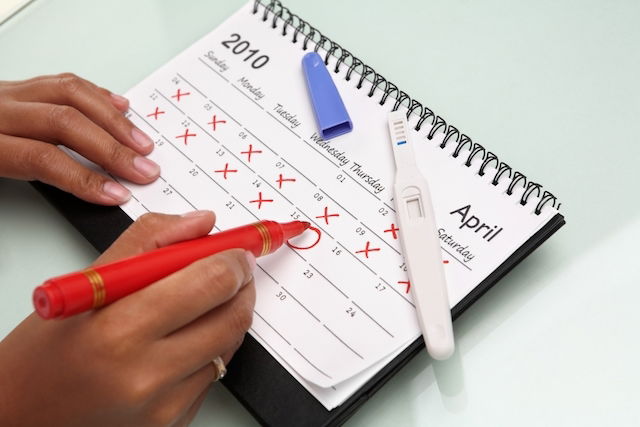How To Get Periods Immediately If Delayed
A delayed period is not always a sign of pregnancy, as other situations such as excessive stress, very strong emotions, hormonal changes or even excessive consumption of caffeine or alcohol can lead to a delayed period.
Generally, this delay can last from 1, 2, 3 or 5 days to 1 to 2 months, and it is recommended that you see your doctor if your period continues to be delayed for more than 3 months and you are not pregnant, so that the cause can be identified and treated.
However, if there has been unprotected intercourse a few days before, there is a probability of being pregnant, and it is recommended you do a home pregnancy test that can be bought at pharmacies to find out if you really are pregnant.

Possible causes for a late period
If your period is late and you have performed at least 2 pregnancy tests in the last month, with a 7-day interval between testing, you are very likely not pregnant, and the delay may be due to other situations such as:
- Excessive physical activity, which is frequent in athletes or people in preparation for a sporting competition;
- Very restrictive diets;
- Poor diet or eating disorders such as anorexia or bulimia;
- Excessive stress;
- Ovarian changes;
- Diseases affecting the hypothalamus or pituitary gland;
- Hormonal changes caused by polycystic ovarian syndrome, endometriosis, fibroids or even by the morning-after pill;
- Taking the continuous use pill that leads to an absent period;
- Recent curettage or surgery in the pelvic region;
- Proximity of menopause, or possibility of early menopause;
- Postpartum phase, because menstruation should only return after the woman stops breastfeeding, although it is necessary to use contraceptive methods during breastfeeding;
- Prolonged use of a contraceptive: there may be no period for 6 months, or 1 year after the use of the quarterly contraceptive injection.
These situations can lead to the absence of your menstrual cycle for more than 3 months (amenorrhea) and it is recommended that you see your doctor if this happens.
Menstruation can also be considered delayed when a girl who has reached the age of 16 has not yet menstruated for the first time, in which case it is called primary amenorrhea and should be investigated by a gynecologist. This delayed period may be related to problems such as head trauma, prematurity or defects in the reproductive system such as imperforated hymen, vaginal septum, and also absence of a uterus.

What to do if your period is delayed
If your period is late, the first step is to carry out a pregnancy test from the pharmacy, but if you haven't had a period for more than 3 months and you cannot identify the cause, you should go to a gynecologist so that he can identify the cause and treat the problem, and, in some cases, the use of medication is recommended so that your period begins.
The doctor may order tests such as the serum progesterone test and the serum prolactin levels to be able to identify the reason for this delay and indicate the most appropriate treatment.
Also, depending on what is causing your period delay, you may need to reduce the intensity of physical exercise, take it easy, avoid stress and maintain a varied and balanced diet rich in vitamins and minerals because this will help to regulate your menstrual cycle.
It is also recommended that you see your doctor regularly to identify possible health problems or diseases such as polycystic ovaries, endometriosis, anorexia, bulimia, hyperthyroidism or hypothyroidism that can cause changes to your menstrual cycle.
How to regulate your menstrual cycle
In addition to drinking teas that may help bring on menstruation, there are certain measures that can help avoid situations where the menstrual cycle is not regular, such as:
- A healthy lifestyle, with regular physical exercise and a healthy and varied diet, rich in fruits and vegetables;
- Take the contraceptive pill, as it can help to regulate the menstrual cycle;
- Avoid extreme or restrictive diets, which, as well as doing harm to your health, end up making your menstrual cycle irregular;
- Follow the indicated treatment for the control of Polycystic Ovarian Syndrome or thyroid disorders;
- Maintain your ideal weight.
These measures help to keep menstruation regular, but it is always recommended you see a doctor to identify why your cycle is irregular.
When should my period appear?
Put in your data and find out when your period is supposed to begin:
How To Get Periods Immediately If Delayed
Source: https://www.tuasaude.com/en/late-period/
Posted by: eaglewelinigh.blogspot.com

0 Response to "How To Get Periods Immediately If Delayed"
Post a Comment